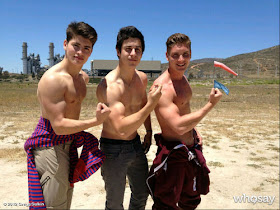What I read was obviously about a stymied same-sex courtship. The middle-aged writer visits Venice on holiday, and becomes obsessed with the beautiful 15-year old Tadzio. He watches the boy and follows him around Venice, but does not approach.
Aschenbach notices that there is a cholera epidemic in Venice, being covered up by the authorities, but he doesn't warn Tadzio, for fear that he will leave, and beauty will be lost to the earth. Nor does he leave town himself; he sits, watches Tadzio, and smiles. Finally he succumbs to cholera and dies. I couldn't help noticing the parallel with Herman Melville's Billy Budd, which we were reading in my American Renaissance class at the same time.
Why didn't Aschenbach just strike up a conversation with the boy? I wondered. Same-sex act were legal in Italy, and the age of consent was 14. Maybe he thought the match inappropriate due the age difference? Maybe he was just shy, or maybe same-sex desire was so alien to his self-image that he was paralyzed? When Tadzio smiles at him, inviting a "hello," Aschenbach runs away in terror and whispers "I love you" to an empty garden.

But Dr. Weber said: "Aschenbach's obsession for Tadzio is the desire of age for youth, for the new that will supercede the old, even of civilization for savagery. It is a quest for ideal beauty that always kills. When Icarus flies too close to the sun, he dies. There is no hint of homosexuality in the novel."

As "proof" that Aschenbach and Tadzio, like all fictional characters, were straight, Dr. Weber showed us the 1971 film version, Morte a Venezia (this was the same class that showed us a beefcake version of Das Nibelungenlied). Tadzio was played by 15-year old Swedish actor Bjorn Andresen (left).
But in the movie, Tadzio is obviously gay, engaging in homoerotic horseplay with his friends. He even appears to have a boyfriend. And Aschenbach, played by gay actor Dirk Bogarde, is obviously gay, too. They are separated not by sexual orientation, but by their different worlds.
So the obsession becomes that of an old-style gay man who believed that his same-sex desire was "too personal" to reveal, who pretended to be heterosexual, who married a woman, and who now longs for the freedom of modern gay youth, cavorting openly on the beach.
See also: Male Nudity in German Class; and The Gay Werewolf of Steppenwolf.


















